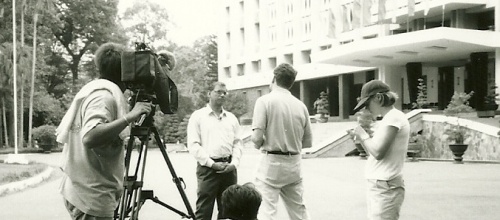In late 1969, while a student of history and Asian studies at the American University in Washington D.C., I made a risky decision that would shape the rest of my life. I dropped out of school, boarded a plane, and ended up in Saigon.
The route to Saigon was largely an accidental one. As a student of history and Asian studies my dream was to go to China. I flew to Tokyo first. If I could get to Hong Kong perhaps the China Travel Service would issue me a visa. But China was not to be.
At the Kyoto Japan World's Fair in March 1970, (where I was 'stringing' to make ends meet)I met Alan Dawson, radio reporter for Metromedia, a fledgling American broadcast network [many years later to be acquired by Rupert Murdoch's FOX.] Dawson was poised to move on. New opportunities awaited at U-P-I. Within a month, Metromedia Washington asked me to replace him.
My first glimpses of Saigon in early April 1970 were on the back on Dawson's motor cycle. I saw it as an assignment of a few months or perhaps a year before I could get back to the pursuit of a China visa. It turned out to be a forty year acquaintance with a most addictive land.
I had arrived in Saigon totally ill-equipped for covering a conflict that had been raging for ten years before my arrival. I possessed only three assets: curiousity, a thirst for adventure, and an aversion to getting killed. I was certainly the greenest war reporter to have ever set down at Ton Son Nhat airport.
My total knowledge of Indochina was buried in my back pack: three books: Graham Greene's "The Quiet American,"Bernard Fall's "Hell in a Very Small Place," and Andre Malroux' "La Voie Royale." The last was meant to improve my fledgling French language skills. Someone (a misguided old colonial no doubt) told me that French was essential to working in Vietnam. Vietnamese language lessons would have been a better investment.
Still, the books stood me in good stead and forty years later, I still regard them as among the best ever written about Indochina.
I was lucky to have a handful of steady guides to initiate me in the ways of Saigon. My college room mate Jim Russell provided some essential introductions. He had arrived in Vietnam the year before for U-P-I. Dawson made sure I saw the city from the back of his motorbike. Bill Dowell, a freelance reporter just out of the U-S Army, quickly became a regular companion to morning cafes on Tu Do Street and to the fields of combat beyond.
Later the Australian reporter and cameraman Neil Davis would become my principal tutor.
I found a desk in his office at Visnews in the Passage Eden. I think I took the spot formally occupied by an Indian money changer who Neil had given space to. Visnews thought it a bit unseemly that blackmarket money exchanges should be conducted on news agency premises. So they got me instead on the approval of Russell Spurr, Visnews' boss in Hong Kong. To complete the arrangement, the Visnews office manager Juliette Suong could not have been more generous in her support. When Juliette (now living outside Washington D.C. and her constant friend Vu Hong Lien (now living in London) of the Asahi Shimbun arrived in the Visnews office each morning, my day was made.
|

